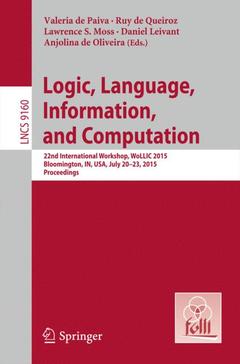Description
Logic, Language, Information, and Computation, 2015
22nd International Workshop, WoLLIC 2015, Bloomington, IN, USA, July 20-23, 2015, Proceedings
Theoretical Computer Science and General Issues Series
Coordinators: de Paiva Valeria, de Queiroz Ruy, Moss Lawrence S., Leivant Daniel, de Oliveira Anjolina G.
Language: English
Subject for Logic, Language, Information, and Computation:
Keywords
Automata theory; Automated reasoning; Category theory; Coalgebraic logic; Completeness; Complexity theory; Decidability; Finite model theory; Linear logic; Logic and verification; Mathematical logic; Modal and temporal logics; Natural language semantics; Proof nets; Proof theory; Rewriting theory; Separation logic; Theoretical computer science; Topological semantics; Type theory
Support: Print on demand
Description
/li>Contents
/li>Comment
/li>
Edited in collaboration with FoLLI, the Association of Logic, Language and Information this book constitutes the refereed proceedings of the 22nd Workshop on Logic, Language, Information and Computation, WoLLIC 2015, held in the campus of Indiana University, Bloomington, IN, USA in July 2015.
The 14 contributed papers, presented together with 8 invited lectures and 4 tutorials, were carefully reviewed and selected from 44 submissions. The focus of the workshop was on interdisciplinary research involving formal logic, computing and programming theory, and natural language and reasoning.
Interdisciplinary research in pure and applied
Logic up-to date results
Fast track conference proceedings
Includes supplementary material: sn.pub/extras




